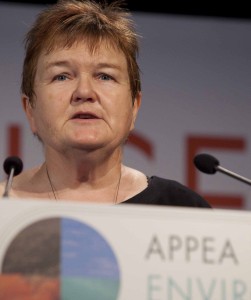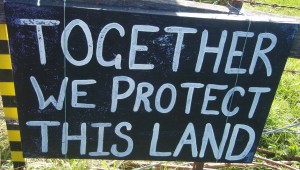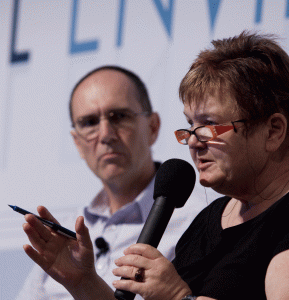In mid-2011, a speaker’s agent rang me to say he had an invitation for a good speaking engagement.
“It’s with APPEA,” he said, “And you can talk about community engagement.”
APPEA. Hmmm. I rang off and logged on.
APPEA: Australian Petroleum Production and Exploration Association is the peak national body representing Australia’s oil and gas exploration and production industry. They call themselves “the voice of Australia’s oil and gas industry”.
See: https://www.appea.com.au/about-appea/
“Do you know who they are?” I exclaimed an hour later.
“No, but they pay well” was his response.
“They`re the peak industry body for the coal seam gas industry,” I moaned. “How can I speak to them?”
“I’ll leave that up to you,” was his reply.
In the end, I made the speech. I sought advice from politicians, academics environmentalists and activists far and wide, sharing part of my fee.
I spoke to APPEA’s Environmental conference in November 2011 in Coolum, Queensland. To a marquee full of young miners. I told them what I could see coming if they persisted with their plans to mine for gas in the Northern Rivers.
Most stared at me as though I’d come from Mars. The young ones shrugged it off”¦ But the older ones – men my age – they listened and asked lots of questions.
Not surprisingly, once I’d given them a serve, they did not ask me to speak to another APPEA conference.
My observations
Now, looking back, I feel like poor Cassandra. Doomed to see the future but not to be believed.
My observations in my speech amounted to something like this: If you continue the way you’re going (like bully-boy cowboys), your approaches will not lead to successful outcomes. Your reductionist and coarse utilitarianism will be seen for what it is: ethically and politically suspect. There will be strong suspicions of corruption.
Ten stages
I can imagine what will happen. It will happen in ten stages.
Stage 1
The young companies, acting like cowboys, standover merchants and bully-boys (the Wild West) will take over from the regulation-oriented companies that are trying to do things properly. Eclipsed will be the wise, older and more experienced operators who know how to consult and build and maintain trust.
Stage 2
Local politicians and activists will try to uncover what’s really happening.
Meetings will be held and approaches made to local politicians. There will be press coverage, especially letters to the editor.
Stage 3
As things hot up, there will be an increase in anxiety and conspiracy theories.
Local action will intensify: committees, petitions, letters to the editor and politicians, more meetings, plans for non-violent direct action”¦ Neighbours will be pitted against neighbours in a climate of fear and intimidation. Press coverage fans the flames in an atmosphere of fear, confusion, distrust and anger, fuelled by `cowboy’ tactics, especially secrecy and bullying.
Stage 4
A neighbour opens his or her gate. He’s short of cash, can’t pay his rates, his rego is due … whatever”¦ He signs an agreement. There will be trucks, equipment, activity, noise, lights”¦ Drilling begins (or will soon).
Stage 5
People are galvanized into action. Activist campaigns are extended and strengthened. New organisations form, with signs, websites, social media”¦
Stage 6
Citizens engage in direct action.
Stage 7
The industry (acting like Grabbit and Runn Pty Ltd) follows the Canadian example and begins a massive public relations campaign: We Love CSG. Locals are left with David and Goliath comparisons. Local politicians and activists organise but feel lied to, kept in the dark, intimidated and steamrolled.
Ordinary people feel they have no voice. “The big end of town is against us. We are treated like ignorant country hicks.”
Stage 8
New alliances form. Activists and politicians form (often previously unheard-of) alliances. Politicians, farmers, hippies, experienced activists, young people, environmentalists, townsfolk”¦ old and young, city and country, Left and Right, rich and poor”¦ I told them about the warnings of Dr Wayne Somerville, a consulting psychologist in Lismore: Now another storm of upheaval and protest is brewing. And Australia might be in for an even more terrible time than the Vietnam War.
Stage 9
The press has a field day. Politicians and activists now capture media interest. Bad news overwhelms the industry’s “good news” stories. This is not good for the oil and gas business.
Stage 10
Finally, I told them, your industry is on the back foot. Now science is argued in public. The industry has no control over the quality or accuracy of information. Nobody loves the miners except those who opened their gates. Many of their neighbours are now not speaking to them. The industry’s media campaigns backfire.
That’s what I suggested. It did not turn out that way – exactly – but a lot of it is similar to what has occurred at Bentley.
I told the miners:
“The economic forces you understand well “¦ and manipulate well “¦will work to your advantage. But not totally and not forever. And If you don’t find a way to engage with communities — an authentic way that’s going to work – you will have a community that engages with you.”
And you will have the biggest protest that Australia has ever seen.”
At the end of my 2011 talk, I asked a rhetorical question: “How will this end?”
My reply: “In tears. This will make Terania Creek look tiny.”
I looked out at my audience. Blank, young, confident faces everywhere.
I gasped: “Does anyone know what happened at Terania Creek?”
Nada.
Then the Chair of my session, also the Chairman of the organisation (and close to my age), spoke up.
“I remember,” he said.
He remembered the non-violent direct action at Terania Creek. Premier Neville Wran called it his proudest moment when he banned rainforest logging in NSW. He only wished he’d done it earlier.
What’s needed?
What’s needed, I said, was a good engagement process. It has three criteria: representativeness, influence and community education. I explained how to do it. Simple rules that required authenticity, honesty, accountability and transparency. Above all, I warned them, “avoid conflicts that involve the police.”
* * *
I think we’ve all seen what an appalling community engagement process looks like.
For me, I wish I’d been wrong. I feel like Cassandra: the prophetess who wasn’t believed.
Now we can see what communities can and will do. What resourcefulness and resilience look like.
What they sound like.
Believe me, Metgasco
Believe me, Metgasco, this is just the beginning. There is much more where this came from.
Best you start listening now.
And best you read your environmental history.
New South Wales — and especially the Northern Rivers (what on Earth were you thinking?) — are not for the taking.
Postscript 18 May: See this great article in the Green Left Weekly: https://www.greenleft.org.au/node/56473



Yes, thank you,
And I wonder what the Community Engagement Officer at SCU has been doing or has had to say?
Thank goodness for you and others who have protected their freedom to speak up and out! Leonie
That’s an excellent question, Leonie. I wonder where that University community engagement person was when the decision was made by Southern Cross University to provide the catering for the police. I know where I’d have been if I were in such a job! I wonder if the University even consulted their in-house specialist on that matter. A really important part of enlightened campus management these days involves matters such as “Good Neighbour Accords” — where “town-and-gown” issues are clearly aired in public forums. It’s pretty shocking to imagine that those in charge of our local university even thought that such an action (feeding the police) would be acceptable to the wider community of the Northern Rivers. And given the huge success of the Bentley camp in feeding its residents and thousands of visitors, I think we’d have to conclude that the Bentley protectors won the catering battle hands down!